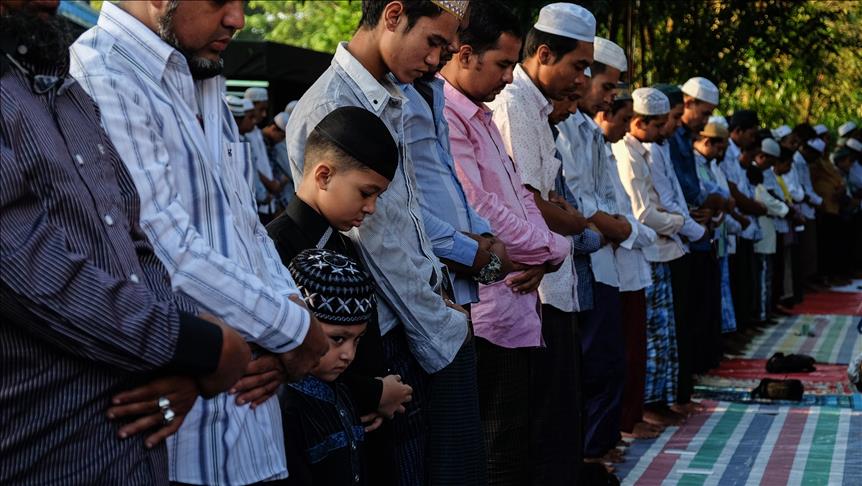Myanmar Muslims combat nationalist pressure on Eid
Slaughter of Eid al-Adha celebrated - albeit under wraps - despite pressure from nationalist monk-led anti-islamic body
 Myanmar Muslims perform Eid Al-Adha (Feast of Sacrifice) prayer in a Muslim cemetery in Hlaingtharyar Township in Yangon, the former capital of Myanmar on September 13, 2016.
Myanmar Muslims perform Eid Al-Adha (Feast of Sacrifice) prayer in a Muslim cemetery in Hlaingtharyar Township in Yangon, the former capital of Myanmar on September 13, 2016.
Myanmar
By Kyaw Ye Lynn
YANGON, Myanmar
Thousands of Muslims have defied pressure from hardline Buddhist monks to crowd a muddy cemetery in Myanmar's commercial capital to await the ritual slaughter of Eid al-Adha livestock.
Unlike most Muslim countries, Eid al-Adha starts officially in Myanmar on Tuesday.
Many participants had braved the heavy rains of the previous day to camp out overnight in their vehicles in Yangon's Haling Thar Yar Township among the shrieks and bleats of the animals.
Nearby, police crowded the slaughter zone, urging people not to leave the area before cleaning blood from their bodies and clothes.
Myo Myint, a 51-year-old Muslim man perched on a plastic mat alongside his family outside the compound prayer hall, proudly tells Anadolu Agency that he is from Pabetan Township in downtown Yangon.
“The situation is uncomfortable, but we are happy,” he tells Anadolu Agency.
This year, those gathered were forced to keep their celebrations low-key, fearing reprisals from a nationalist group that last week wrote to local authorities demanding they ban the slaughter.
Authorities, however, ignored the request.
“The letters claimed that local Muslims were preparing for the slaughter without the correct permissions,” a senior official from Yangon's regional government told Anadolu Agency by phone Monday.
“But the place [Haling Thar Yar] is one of 13 that authorities permitted to carry out the slaughter,” he said on official on condition of anonymity as he was not authorized to talk to media.
“We have also provided security for such slaughter zones.”
The group pushing for the ban -- the Association to Protect Race and Religion (better known as Ma Ba Tha) -- has been seen as deliberately stoking the flames of religious hatred against Muslims, with one of its senior leaders -- Buddhist monk Wirathu -- blaming them for communal conflicts, and accusing them of attempting to Islamize the majority Buddhist country of 57 million people.
On Monday, another Ma Ba Tha leader described the festival to Anadolu Agency as "cruel", in an effort to legitimize its request.
“Religious festivals should not involve such mass killings of animals,” Pamaukkha, the abbot of Magway monastery on the outskirts of Yangon, underlined
He added that Buddhists are uncomfortable at the very idea of so many cows being "mercilessly beheaded".
“They should just use goats!" he stated. “Such festivals should be banned permanently here as the killing is against Buddhism.”
Such pressure is consistent with a nationalist push that has run across the country since communal violence broke out between Rakhine Buddhists and stateless Rohingya Muslims in western Rakhine state in 2012.
In the ensuing unrest, 100 people died and around 140,000 people were displaced, mostly Rohingya.
Muslim organizations subsequently canceled the Eid celebrations in 2012 out of fears for participants' safety, although it reappeared in 2013 but only after the Islamic Religious Affairs Council (IRAC) imposed restrictions on where and how the slaughter could be conducted, and how to transport livestock and meat.
On Monday, the secretary of the IRAC -- the country's official Islamic body -- recalled that 2012 was the first time that the slaughter had been called off in the country's history.
“We are also aware that there are people who disagree with our religion this year,” Tin Maung Than told Anadolu Agency by phone.
“Therefore we have taken great care with the slaughter so as not to give rise to criticism,” he said.
Tuesday's slaughter was tightly controlled.
Wunna Shwe, from the festival's organizing committee, told Anadolu Agency that nobody was allowed to photograph in the slaughter zone -- "not even take images of the sacrificial animals" -- for fear of the tensions the photos could inflame.
“We also instructed donors to conceal the meat in bags as we don't want to be the source of any unnecessary problems,” added Wunna Shwe, who is also a joint secretary of the IRAC.
After the slaughter, the service took on a more customary air, with Muslims taking the bags home to share with neighbors.
“Business has been good this year, so I donated two cattle,” said local man Myo Myint before entering the slaughter zone to pick up his meat.
“I will donate the skins to a nursing home for Muslim elders in Yangon, and then the meat will go to the poor and neighbors.”
Anadolu Agency website contains only a portion of the news stories offered to subscribers in the AA News Broadcasting System (HAS), and in summarized form. Please contact us for subscription options.



